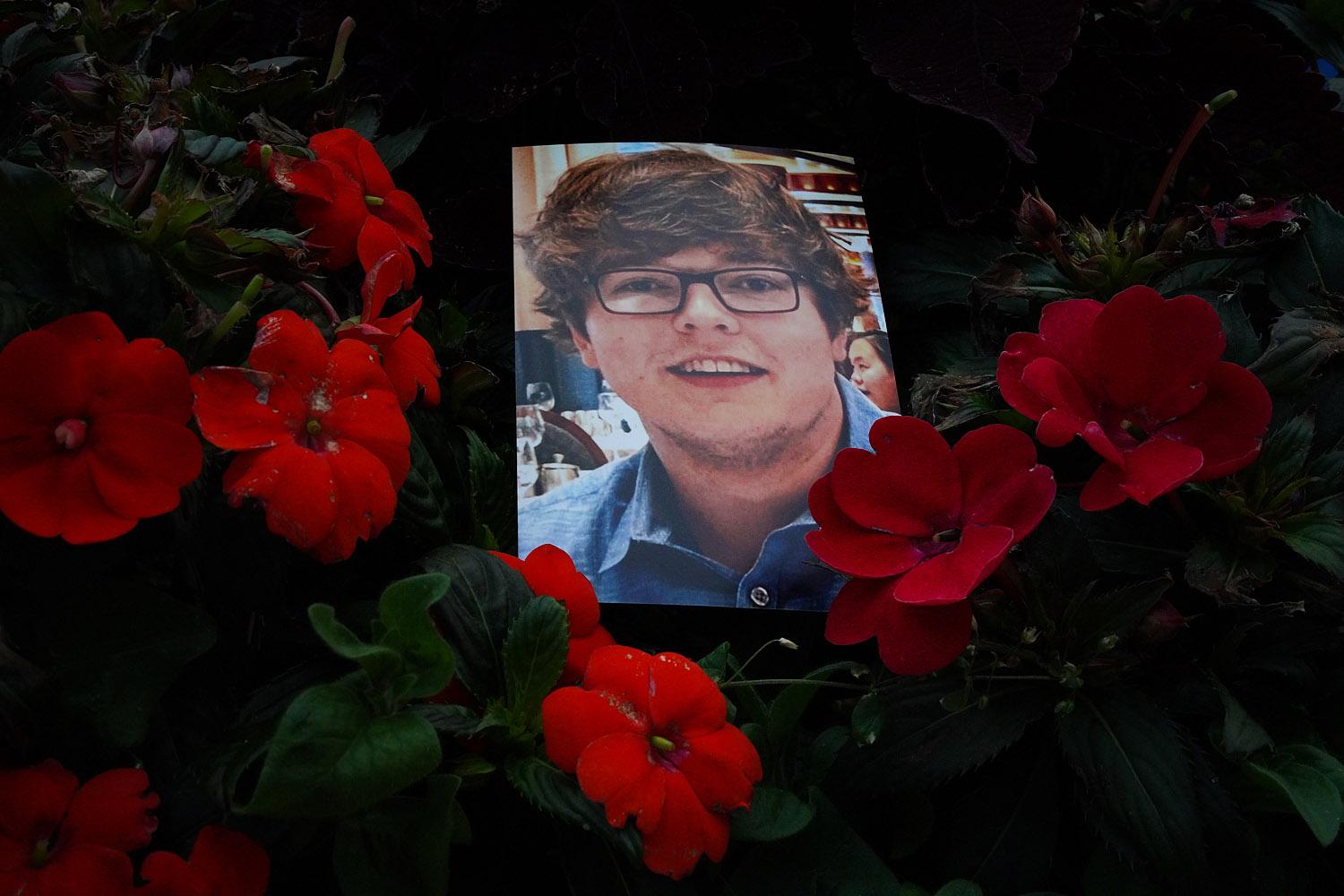
As a child, Will Liverman would listen to cassette tapes from the 1980s and 1990s that his mother had produced in which she sang her own gospel tunes. Those moments are some of his earliest musical memories.
"My mom inspired me musically because of my upbringings in church. She was the lead songstress... and as a result of that, I started singing choir and also got involved in playing piano in the church," the baritone told Morning Edition host Michel Martin.
Liverman says he had always wanted to work with his mom. And when the opportunity finally presented itself, it became the beating heart of a new album celebrating women.
He dreamt up the project in the early days of the pandemic in 2020 with pianist Jonathan King, who accompanies him on the album
"We were kind of sitting around wondering what was going to become of the world," Liverman said. "I thought of my mom, who was my biggest inspiration growing up."
Show Me The Way features five world-premiere recordings by living composers commissioned by Liverman, including new song cycles by Jasmine Barnes and Libby Larsen. Star singers J'Nai Bridges and Renée Fleming also make appearances on the album, out on March 8, International Women's Day.
The album is a bit of a companion to a Grammy-nominated album showcasing Black composers in 2021. That same year, Liverman sang the lead role in Terence Blanchard's Fire Shut Up in My Bones, whose original production was the first of an opera by a Black composer at the Metropolitan Opera. Liverman and the rest of the cast won a Grammy for a Met recording of the piece. This season, he sang the lead role in X: The Life and Times of Malcolm X at the Met.
On the latest album's final track, Terry Liverman sings while her son plays piano in their joint arrangement of Alma Bazel Adrozzo's "If I Can Help Somebody." Gospel groups have recorded the hymn, which was also reprised by mainstream artists like Tennessee Ernie Ford and Doris Day.
Terry Liverman's voice soars with the lyrics "No, my living shall not be in vain" in a soulful interpretation on top of her son's jazzy chords.
A Sable Jubilee sees Tesia Kwarteng's first commissioned libretto hailing Black joy, loosely associated with a movement of resistance, resilience and reclamation. It's set to a layered and uplifting score penned by Barnes, a young composer who Liverman calls "the future of opera."
In terms of the song cycle's themes, Liverman said he was looking for a break with the often told stories of Black pain.
"We wanted to showcase Black joy, just like what it means just to be Black and have that be enough," he added.
Larsen's Machine Head: Ted Burke Poems, meanwhile, takes inspiration from the eponymous San Diego-based poet, critic and bookseller. The set begins with bluesy riffs narrating a father and son waiting for a mother to return from her shopping trip, with the child's impatience portrayed by a dissonant treble chord.
The relentless rhythm of the last song's boogie-like introduction imitates the frenetic pace of the industrial machinery that drives modern lives. It's an ironic reflection of the bad habits picked up along the way, and the losses that accompany them. A similar theme of destruction, this time from wildfires, permeates Kamala Sankaram's "Spell to Turn the World Around."
Trailblazing 20th century composers Florence Price, Margaret Bonds and Amy Beach also get nods, as well as Ella Fitzgerald, through an arrangement of "You Show Me The Way," which she performed with Chick Webb at New York's Savoy Ballroom.
Nicole Cabell sings alongside Liverman in an especially lush duet from Beach's rarely performed opera Cabildo, accompanied by violinist Lady Jess and cellist Tahirah Whittington.
Fleming, a mentor to Liverman who's been dubbed "America's diva," joins him for Sarah Kirkland Snider's "Everything That Ever Was." Bridges, meanwhile, makes an appearances for Rene Orth's funereal "A Prayer."
The project had Liverman pondering about his musical roots. Gospel, he says, is the "blueprint" of his musical background, having only discovered opera as a teenager. Gospel songs aren't written down, and must be memorized instead, so "it's all feel and we really strengthen that skill of listening to something and repeating it back" he added.
In addition to his gospel-singing mother, Liverman's father was a jazz trumpeter who also played the piano and sang.
"I'm just so thankful with how they supported me when I decided that I wanted to pursue classical singing, this foreign art form that just sort of came into the picture that no one really knew about how you can make a career," the singer said.
"If it wasn't for that type of support, I don't know if I would have stayed in or really pursued classical music at the undergraduate level and continued on," he continued. "So yeah, I really have both of my parents to thank for my background and music and where it all started."
The broadcast version of this story was produced by Barry Gordemer. The digital version was edited by Treye Green.
9(MDEyMDcxNjYwMDEzNzc2MTQzNDNiY2I3ZA004))
Transcript :
MICHEL MARTIN, HOST:
Baritone Will Liverman has lent his voice to crucial stories of the African American experience told on the opera stage. This season, he sang the title role in "X: The Life And Times Of Malcolm X" at the Metropolitan Opera. He also sang the lead role in Terence Blanchard's "Fire Shut Up In My Bones." The original production in 2021 was the first of an opera by a Black composer at the Met and won Liverman a Grammy. He is also a composer and pianist seeking to push this traditional art form forward. And he's done this in his latest album, "Show Me The Way," a project that showcases women's contributions to classical music and new work.
(SOUNDBITE OF SONG, "A SABLE JUBILEE")
WILL LIVERMAN: (Singing) Like joy is a tapestry woven by burly laugh.
MARTIN: That's "A Sable Jubilee," a commission composed by Jasmine Barnes with text by Tesia Kwarteng. It is one of five world premiere recordings on the album. I caught up with Will Liverman as he was rehearsing for another Met production, and he's with us now to tell us more about this latest album. Hello, welcome, thank you for joining us.
W LIVERMAN: Hey, happy to be here. How are you?
MARTIN: I'm good. You know, your last recital album featured Black composers. In this album, you decided to feature women composers. What gave you the idea?
W LIVERMAN: So it was actually in the height of the pandemic. And Jonathan King and I, my collaborator and pianist, thought of this album together on the couch while we were kind of sitting around wondering, you know, what was going to become of the world. And, you know, I thought of my mom, who was my biggest inspiration growing up. You know, she was a gospel singer and also a writer, and that sort of was a big inspiration into, OK, well, let's do something to honor female composers.
(SOUNDBITE OF SONG, "YOU SHOWED ME THE WAY")
W LIVERMAN: (Singing) You showed me the way. My sky was so gray.
MARTIN: So let's wheel around to some of the composers that you showcase in the album. You sing "I Grew A Rose" and "Songs To The Dark Virgin" by Florence Price. She died in 1953. Briefly, just tell us about her and why you wanted to feature her.
W LIVERMAN: My high school teacher gave me the anthology of Black composers. And she was the first African American woman recognized as a symphonic composer, like, over 300 or so works, concertos, art songs, choral works. So "I Grew A Rose" is one of my favorite songs on the album. Actually, it was the very first song that I learned.
(SOUNDBITE OF SONG, "I GREW A ROSE")
W LIVERMAN: (Singing) My rose began to open, and its hue was sweet to me as to it sun and dew.
MARTIN: Now, you've said that you - part of your mission, as you see it, as an artist, is to try to push opera forward. You have five world premiere recordings here. You know, maybe, you know, pick one, maybe Jasmine Barnes. Like, why did you choose her?
W LIVERMAN: Yeah, Jasmine is one of the first people we actually thought of because, you know, I think she's what the future of opera is going to be, you know, how she writes and how she approaches music. Because she's also a singer, knows how to really approach the vocal line in a way that's just so - I mean, you can really just get right into the line and know exactly what she wants.
(SOUNDBITE OF SONG, "A SABLE JUBILEE")
W LIVERMAN: Metallic freedom that never loses its luster.
"A Sable Jubilee" was something that I thought to do because, you know, we have so many stories and things to do with Black pain. And that's, you know, important to tell, the hard truths of our history, you know, and significant works like that. But we wanted to showcase Black joy and just, like, what it means just to be Black.
(SOUNDBITE OF SONG, "A SABLE JUBILEE")
W LIVERMAN: (Singing) This joy is luxury, themes and variations of onyx.
MARTIN: One of the things I think, obviously, we're seeing and that your career represents, shows, opera taking on, I mean, this 400-year-old art form taking on new ideas, bringing in new people, addressing issues that people perhaps aren't used to seeing opera take on. Is there something else you think needs to change?
W LIVERMAN: Yeah, I mean, it's all post-pandemic and George Floyd. We saw, you know, that sudden shift in what we're seeing onstage and in lots of new pieces and new storytelling, and folks on the other side of the table, BIPOC directors and writers and creators. But I think there's still work to be done with, you know, finding and cultivating new board members, finding ways to bring in new money and new folks who can make decisions on the other side of the table.
(SOUNDBITE OF SONG, "A SABLE JUBILEE")
W LIVERMAN: (Singing) Evidenced by the culture, we set the tone.
You know, I love the "La Bohemed" and "The Magic Flutes" and the "Barber Of Sevilles." They're classics for a reason. It's incredible to see that those pieces written hundreds of years ago still sell out audiences. But art reflects life, and we have to continue to find ways to bring up new works and find ways to get the people in and keep them in and come back to see other things. And really, for me, it's the work on the other side of the table, cultivating new board members, getting more diversity and inclusion in our leadership to really push it all together.
MARTIN: Well, on that note, we're going to hear your mom, Terry Liverman, singing her own arrangement of "If I Can't Help Somebody." And you are accompanying her at the piano. Will Liverman, thanks so much for joining us. Thanks so much for your time.
W LIVERMAN: Yes, thank you so much. I appreciate it.
MARTIN: That was Will Liverman. His new album, "Show Me The Way," is out Friday.
(SOUNDBITE OF SONG, "IF I CAN'T HELP SOMEBODY")
TERRY LIVERMAN: (Singing) If I can help somebody as I travel... Transcript provided by NPR, Copyright NPR.
BONUS: Listen to Will Liverman's new album









